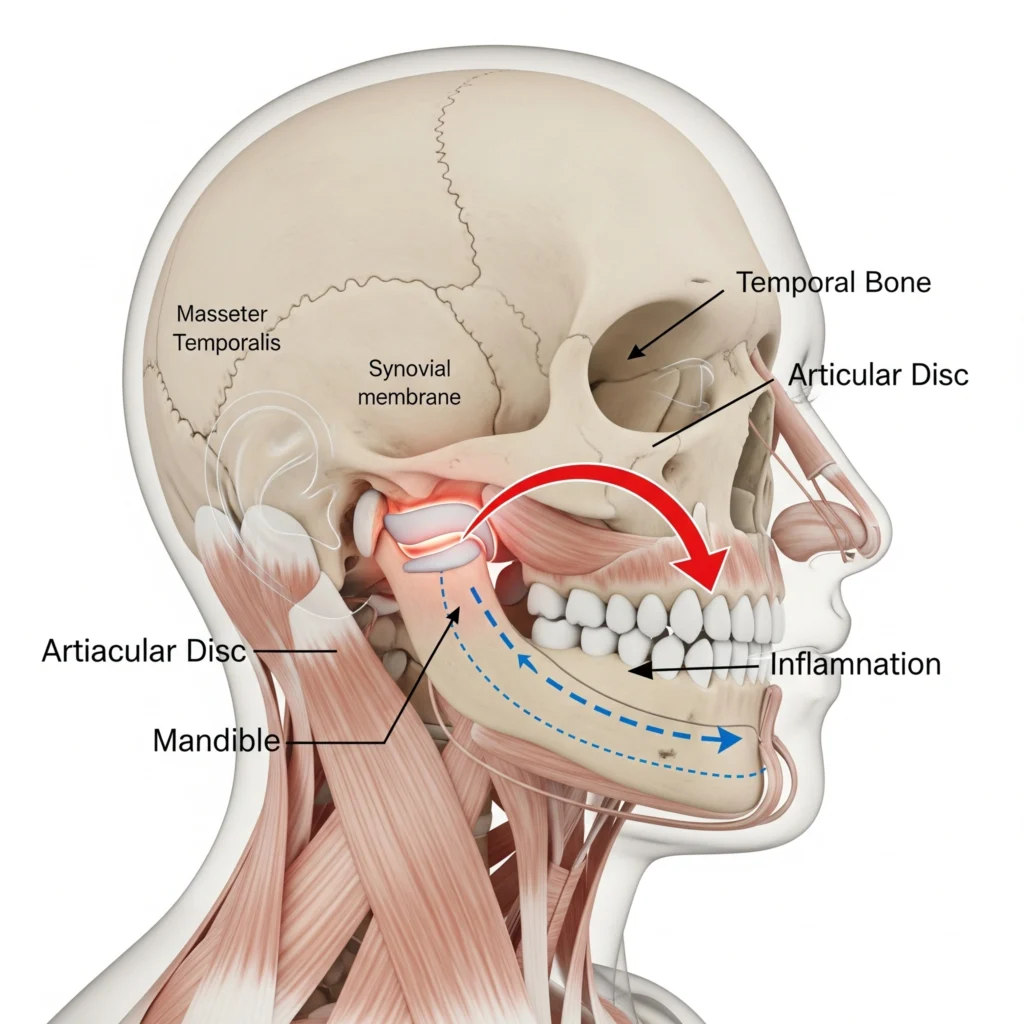Temporomandibular Joint Disorder is a commonly ignored yet painful condition affecting the joint that links your jaw to the base of your skull. This vital joint is essential for speaking, chewing, yawning, and overall facial movement.When it’s not functioning correctly, it can result in pain, discomfort, and even limited jaw movement.
Recognizing the symptoms, finding the cause, and getting early treatment are vital for managing this disorder and enhancing quality of life.In many cases, simple solutions can offer significant relief and prevent long-term damage.
The temporomandibular joint (TMJ) is one of the most complex joints in your body. It works like It acts like a hinge, allowing the jaw to move up, down, and side to side. However, when this joint becomes strained or misaligned, it leads to Temporomandibular Joint Disorder.
Though both men and women can be affected, women aged 20–40 are diagnosed more frequently. The disorder can appear suddenly due to injury or develop gradually from chronic habits or underlying conditions. Thankfully, most cases are treatable through conservative methods.

Recognizing early signs of Temporomandibular Joint Disorder helps in addressing it before it worsens. Common symptoms include:
In certain cases, the symptoms can be mild and temporary. However, when they become persistent, it’s essential to seek professional evaluation.
Various factors can contribute to Temporomandibular Joint Disorder, and the root cause isn’t always easy to identify. Often, the condition is a result of multiple influences working together.
Identifying these factors helps your dentist or doctor develop a personalized treatment approach.
A comprehensive evaluation is key to diagnosing Temporomandibular Joint Disorder. During your visit, a dental professional will:
Early diagnosis not only reduces discomfort but also prevents more severe complications down the line.
Fortunately, most cases of Temporomandibular Joint Disorder respond well to conservative treatments. In rare instances, more advanced intervention may be necessary.
Self-Care and Home Remedies
For mild cases, lifestyle adjustments and home care may be sufficient:
With consistency, these small changes can bring noticeable relief.
Dental and Medical Treatments
When symptoms persist, dental care may involve:
These non-invasive methods often restore function and alleviate symptoms effectively.
Surgical Options (Rare Cases Only)
Surgery is considered a final option for those with serious joint damage. Surgical procedures may include:
However, the majority of patients never need surgery to manage their condition.
Preventive care is always better than treatment. Here are some tips to avoid developing Temporomandibular Joint Disorder:
These proactive habits protect your jaw from unnecessary strain and help maintain long-term comfort.
If you’re dealing with symptoms like jaw stiffness or facial pain, don’t wait to get the help you deserve. At Unidental, our skilled dental team is equipped to diagnose and treat Temporomandibular Joint Disorder with compassionate, personalized care.
Schedule your visit today and take your first step toward lasting jaw comfort and improved quality of life.
Yes, mild cases often resolve with rest and self-care. Persistent symptoms, however, require dental evaluation.
No. It can also lead to headaches, earaches, neck pain, and even shoulder tension due to interconnected muscle systems.
Occasional clicking without pain is usually harmless. But if accompanied by discomfort, it may signal a joint problem.
Recovery depends on the cause and severity. With consistent care, many patients see improvement within weeks.
Hyderabad : +91 6305 971445
Anantapur: +91 70758 90089
Goa: +91 83266 32500
Mon to Sat 10:00AM to 8:00PM
Sun 10:00AM to 12:00PM

Our goal is to provide friendly, caring dentistry with the highest standards in general, cosmetic, and specialist treatments. We strive to be the best dental hospital for comprehensive oral care.
We use advanced dental technology to deliver safe, precise, and painless treatments for every patient.